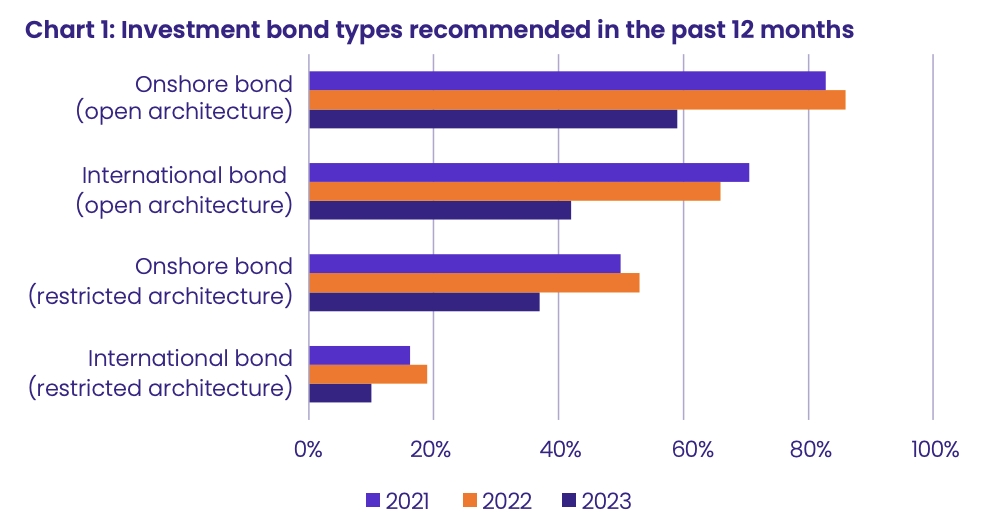Advisers are selecting fewer different types of investment bonds year-on-year but investment bonds remain an important tax wrapper for client money, according to new research.
Defaqto’s newly-released annual Investment Bond Service Review 2024 showed that in 2023 advisers recommended, on average, 1.48 different types of bonds, down from 2.76 in 2022.
The review showed that Prudential dominated the onshore bond market with some 46% of advisers recommending Prudential’s onshore bonds to their clients, a 7-percentage point increase.
Prudential was also advisers’ preferred provider with Quilter edging ahead of Canada Life into second place.
The survey showed that 60% of advisers are now writing open architecture onshore bonds and 40% are writing open architecture international bonds, down from 66% in 2022.
In terms of other investment plans, interest grew for conventional products including pensions and investment ISAs, which had the support of more than 90% of advisers.
Open architecture products remained the first choice over bonds with a limited fund selection, and onshore bonds were preferred to international bonds. Almost 60% of advisers were writing open architecture onshore bonds and more than 40% were writing open architecture international bonds, down from 66% in 2022 and only just ahead of restricted architecture onshore bonds.
Fewer advisers were recommending bonds in 2023; after personal pensions and investment ISAs, only 35% of advisers said they would recommend onshore bonds next and only 19% said they would recommend international bonds.
Regarding international bond providers, Canada Life International (IoM) remained the most recommended, but with less support this time. In 2022, 19% of advisers said they recommended the firm, dropping to 16% in 2023.
Ben Heffer, wealth and protection insight consultant at Defaqto, said: “In reality, Canada Life International (IoM) still dominates the international bonds market alongside Utmost, who’ve risen to become the second most popular provider in the category. With little prospect of any new challengers anytime soon, this probably leaves advisers with little choice for their clients should service levels drop.”
Questioned about their satisfaction with providers, the study revealed that adviser satisfaction scores across all categories were significantly lower than those recorded last time by, on average, eight percentage points.
Mr Heffer said: “The administration categories that are ranked most important to advisers saw the biggest drop in satisfaction. Existing business administration and Administration staff took the biggest hit with drops of 15 and 12 percentage points respectively. The results indicate a general dissatisfaction among advisers with their chosen bond providers, with administration appearing to be the main cause of disapproval.”
• The annual survey measured how satisfied financial advisers are with their preferred providers and identifies where expectations are being met. Defaqto asked advisers how important seven service disciplines are to their businesses using a five-point scale from ‘not at all important’ through to ‘very important’. From this it calculated a mean score out of five to determine the importance of each individual aspect of service. Next, it identified which providers are being used regularly by advisers and asked them to rank them in order of preference. Finally, it measured the advisers’ satisfaction levels with the preferred providers, again using a five-point scale ranging from ‘very dissatisfied’ through to ‘very satisfied’.

